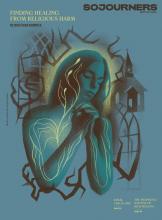IN 2012, a group of scientists from the University of Washington discovered Y chromosomes in the autopsied brains of female cadavers. Finding so-called male DNA in cis women’s bodies certainly complicates our notions of gender! But the focus then was on introducing the sci-fi-sounding concept of fetal microchimerism. Fetal cells, we learned, can remain integrated at the genetic level in someone’s body long after the fetus or baby is not. These cells can be passed on to future siblings, thus embedding visceral relations within our bodies that even the most adept family-systems theorist would struggle to disentangle.
The scientific community labeled this a discovery. But for anyone already skeptical of the mind-body dualisms in Western culture, this was simply science catching up with how we already experience our ancestral relations. Intergenerational wisdom and trauma aren’t simply intellectual concepts. Rather, our ancestors’ presence in our lives connects at sites where body, spirit, mind, and soul inextricably intertwine. And these sites are in desperate need of some decolonizing attention if we’re to reclaim our ancestral relations in our practices of Christian faith. Of course, that might not be something we all want to do. But this month, I’ll engage the lectionary readings through this lens to see what questions and insights might arise. And I’ll do so with the hope that our wide, wondrous communion of saints will read along with us.
Read the Full Article

